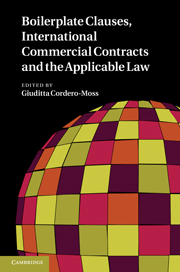Book contents
- Frontmatter
- Contents
- List of contributors
- Preface
- Introduction
- PART 1 How contracts are written in practice
- PART 2 Methodological challenges
- Introduction to Part 2
- 3 Does the use of common law contract models give rise to a tacit choice of law or to a harmonised, transnational interpretation?
- 4 Common law-based contracts under German law
- 5 Comparing exculpatory clauses under Anglo-American law: testing total legal convergence
- 6 Circulation of common law contract models in Europe: the impact of the European Union system
- PART 3 The applicable law's effects on boilerplate clauses
- Conclusion: the self-sufficient contract, uniformly interpreted on the basis of its own terms: an illusion, but not fully useless
- Bibliography
- Index
- References
5 - Comparing exculpatory clauses under Anglo-American law: testing total legal convergence
from PART 2 - Methodological challenges
Published online by Cambridge University Press: 11 April 2011
- Frontmatter
- Contents
- List of contributors
- Preface
- Introduction
- PART 1 How contracts are written in practice
- PART 2 Methodological challenges
- Introduction to Part 2
- 3 Does the use of common law contract models give rise to a tacit choice of law or to a harmonised, transnational interpretation?
- 4 Common law-based contracts under German law
- 5 Comparing exculpatory clauses under Anglo-American law: testing total legal convergence
- 6 Circulation of common law contract models in Europe: the impact of the European Union system
- PART 3 The applicable law's effects on boilerplate clauses
- Conclusion: the self-sufficient contract, uniformly interpreted on the basis of its own terms: an illusion, but not fully useless
- Bibliography
- Index
- References
Summary
Commercial transactions are increasingly global in scope, spanning jurisdictions and indeed legal families and traditions. Within the comparative law framework, globalisation elevates the prominence and relevance of legal convergence through legal transplants, as attempts have been made under private law regimes to achieve certain minimal levels of contractual standardisation. Legal convergence theory, a currently popular yet controversial comparative law concept, holds that different legal systems may apply different technicalities, but in the end arrive at similar results. In essence, significant distinctions between legal systems are frequently only on the surface.
Testing the validity of total convergence theory, this chapter examines specific, commercially important contractual provisions known in the Anglo-American legal family as ‘exculpatory clauses’. Section 1 of this chapter explores the weight and necessity of the comparative legal method. It also further sets the groundwork for this by introducing legal convergence within the context of exculpatory clauses. Section 2 reviews how exculpatory clauses are treated in the US legal context, analyses the legal theory of unconscionability and examines the divergent treatment such clauses receive in different US jurisdictions. While convergence scholarship often involves the comparison of legal concepts between different legal families, this section explores the use of exculpatory clauses within a single legal family, the common law legal tradition. Accordingly, Section 3 utilises a comparative approach, reviewing the use of exculpatory clauses in the context of an important commercial industry, tow and towage, under Anglo-American law. The chapter concludes by surmising that total convergence is problematic.
- Type
- Chapter
- Information
- Publisher: Cambridge University PressPrint publication year: 2011
References
- 2
- Cited by



